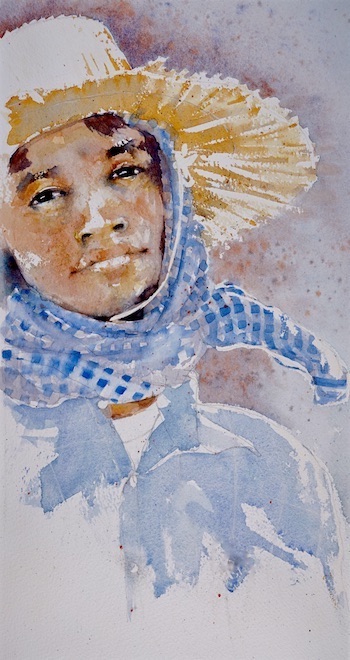Saying No to Love
 In Her image, she created humans with the right and the responsibility to say no to Her Love as we choose. If our answer to Her offer of Love could not be no, with Her blessing, then what She offers us would not be Love. It is Love itself that demands our right to say no. The potential of our no makes our yes to her Love valuable to Her. To my detriment, I have occasionally said no to Her offer, but in retrospect, never once have I been Loved less for my choice.
In Her image, she created humans with the right and the responsibility to say no to Her Love as we choose. If our answer to Her offer of Love could not be no, with Her blessing, then what She offers us would not be Love. It is Love itself that demands our right to say no. The potential of our no makes our yes to her Love valuable to Her. To my detriment, I have occasionally said no to Her offer, but in retrospect, never once have I been Loved less for my choice.
Passerby asks, “So what happens when someone says no?”
“Forgiveness…with no thought of retribution.
The forgiveness that always has been. Since Love is not Love without the possibility of no, She would be unjust to be Love apart from forgiveness.
• • •
Not Perfect
The Spirits’ plan for humanity did not include moral perfection. On this point, the entire fall/redemption theory that some theological speculators have endorsed over the centuries falls apart. There is no fall when the created purpose is never perfection; if there is no fall, there is no need for redemption. The creation narrative tells us that the Spirit created humans from dirt in the image and likeness of the Spirit. My dirt is like my creator.
Humanity’s propensity to refuse Her Love exercises the right to do so that She gave Us. This right is one of the many attributes given to us that is the evidence we are created in Her image.
“Now, the tax collectors and sinners were all drawing near to hear him. And the Pharisees and the scribes grumbled, saying, “This man receives sinners and eats with them [talking about Jesus].”
—John 15
In your reading of the Gospels, have you noticed that Jesus does not reject, vilify, or marginalize sinners? He is, in fact, always up for an environment rich with the potential for relationships (he eats with sinners and tax collectors) and seems to prefer their company over the company of those who spend their energy and waste their Spiritual capital, marginalizing them.
In the parable of ‘the good Samaritan,’ the one whom the religiously pure ostracizes is the one Jesus holds up as the model of Spiritual behavior. The youngest son in the ‘prodigal son’ story was told by Jesus to emphasize the generosity of YHWH toward the human-kind despite the rejection of Her Love. And when her accusers have left, he says to the woman caught in adultery, “Neither do I condemn you, go and sin no more [don’t do that anymore, it hurts people].” Her behavior did not scandalize Jesus. Jesus did not endorse adultery, but it was not a relationship breaker for Him. The people that Jesus had a problem with were those who condemned those who didn’t conform to their moral code. Jonathon Edwards preached a sermon titled “Sinners in the hands of an angry god,” in which he portrayed the Father of Jesus as so angry with humanity that we were suspended by a thread like a spider over a campfire. The implication is that we should be afraid, for he could intentionally drop us into the flames at any moment. Blasphemy.
• • •
She is not Disappointed.
I have never been, nor will I ever be, condemned by my Creator. She is not passive-aggressive or angry with me; She is not disappointed in me, and She is not nursing hurt feelings for some indiscretion on my part. She is Jesus-like.
Paul of Tarsus wrote,
“Who shall separate us from the love of Christ? Shall tribulation, or distress, or persecution, or famine, or nakedness, or danger, or sword?… For I am sure that neither death nor life, nor angels nor rulers, nor things present nor things to come, nor powers, nor height nor depth, nor anything else in all creation, will be able to separate us from the love of God in Christ Jesus our Lord.” The letter to the Romans 8:35-39
Nothing shall separate us. Nothing did. I was never lost. She always knew where I was.
Yes, I am painfully aware that the Christian fundamentalists teach that Paul, in these verses, meant to include only those who are being ‘saved’.
• • •
It is bad mythology, much worse anthropology, and horrible child psychology to believe that something has fatally separated humans from Her, the Creator Spirit (Elohim Throughout Genesis 1), whose Love is unconditional. To paraphrase Karl Barth, Is it possible that the will of a human being to be lost might be stronger than the Love of the Spirit to find her?
I think not. I say with Jesus, the Father and I are one.”
“Thank you, Helder.”